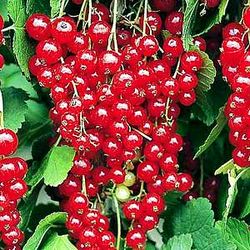Redcurrant
The redcurrant is the larval stage of the watermelon (Citrus aquatica), and much enjoyed as a tasty treat in its own right. It develops from the black seeds of the melon, which upon maturity send out a network of fibres and filaments (hyphae) through the dark red flesh, gradually sucking up all the colour and goodness. As a transitional stage they became blackcurrants before finally taking on their glowing red hue. Those faintly edible white seeds you sometimes see? That's right, they become whitecurrants, but as they're infertile they can't develop any further, which is why you don't see them as often.
After all the flesh of the watermelon has been used up, its hide puckers and forms invaginations, splitting by binary fission into thirty-two (usually, but occasionally sixteen or sixty-four) pomegranates.
Cultivation[edit | edit source]
It's hard enough to grow watermelons long enough to get to the black seed stage, because window boxes invariably tilt and fall off the windowsill, surprising passers-by and neighbourhood cats. Over 80% of cultivated watermelons are eaten by cats.
Consequently, once they've sloughed off their orange peel and passed through the pale-skinned cantaloupe phase they have to be propped up in a kind of pergola made of twigs and wicker. Compost should be laid on top of this, not touching the melon but within smelling distance, encouraging it to strive and expand.
See also[edit | edit source]

|
